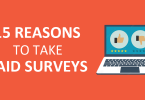For brands who are trying to increase the efficiency of their outreach, online surveys offer undeniably powerful insights into what makes marketing work. As with any other advertising tool, however, they evolve with the times, and marketers need to keep up or risk losing relevancy.
For companies utilizing online surveys, although they are on the right track, there’s no guarantee they’ll stay on top. Best-practice methodologies are changing, and so are the features that survey takers expect. Here’s a look at some of the trends that might play a role in how companies and marketers engage with the online survey panels of tomorrow.
Survey Software Will Become Device Agnostic
Mobile internet usage may seem prevalent as it is, but global adoption rates are only expected to increase in the coming years. Some research even demonstrates that the percentage of survey starts that occur on mobile devices has been climbing steadily since as early as 2011. Desktop starts, on the other hand, have decreased significantly as more respondents use smartphones and tablets.
Online survey creators must cater to user device preferences. It’s a given that surveys should use responsive web technologies that permit their display on smaller screen sizes. They also need to remain accessible to users who continue to check their emails and join survey panels via desktop devices.
Uniform survey and panel management systems that allow comprehensive oversight are likely to become the standard among the market research community. Inflexible, niche software solutions that fail to leverage the cloud may go the way of the dinosaurs.
Geography Will Matter More
As more potential respondents join the growing population of mobile addicts, intelligent panel selection may become the norm. Survey software that chooses eligible participants based on locations, purchases and other real-time information are already commonplace.1
Behavioral data is growing increasingly fine-grained. A future panelist responding about a particular software package or app might expect to be asked questions immediately after using new features or taking specific actions. For instance, surveys might trigger when someone reaches or leaves a business location.
Brands Will Have Their Own Communities
Most major brands already have a community of existing customers and consumers interested in their products at their disposal, anytime a research question arises. These brand-centric online communities are essentially online survey panels that revolve around discussions of one major topic. As the members of such panels have already expressed their interest in a particular brand, it eliminates the need to re-qualify users for new studies. As such, these custom research communities are only rising in popularity, and are projected to continue doing so.
As Automated Analysis Improves, so Will Survey Questions
Some experts predict an increase in the prevalence of open-ended survey questions. Because market researchers can leverage sentiment analysis and machine learning to garner opinions, they’ll be able to generate usable results from a wider range of responses.
Probability Sampling Could Become More Attainable
Non-probability sampling doesn’t incorporate random selection.2 Its place in online survey panel creation could become less important as more illustrative, probability-based methods take root.3
Most early online surveys were largely based on non-probability sampling techniques. A growing public acceptance of online surveys, however, could easily foster a culture where more people are willing to participate.
For instance, incentives such as survey rewards, which are better-known today than in prior years, might motivate more representative populations to respond. The ability to opt-in to surveys via third-party platforms like social media could have a similar effect. Such factors will probably introduce random elements that generate increasingly robust results.
Surveys Will Become SEO Aware and Generate Results Faster
Companies have long employed surveys to hone marketing plans. More refined targeting is sure to accompany increasing data availability. For marketers, search engines could become the best sources of such data.5
Advertisers who build web presences and seek social media engagement can immediately poll consumers to gauge public perception. This gives them even more incentive to integrate feedback mechanisms into their outreach campaigns from day one and start tracking trends early.
It may not be long before pollsters only have to wait a few hours to get their results back, instead of a few days. In addition to being able to leverage extensive software tools to create SEO-aware surveys, they can also use advanced data analysis to zero in on relevant trends.
Sources:
2. https://www.checkbox.com/company-news/2016/01/prepare-yourself-for-these-survey-trends-in-2016/
3. https://conjointly.com/kb/nonprobability-sampling/
4. http://www.knowledgenetworks.com/accuracy/summer2010/aapor-summer10.html
5. https://www.thebalance.com/predicting-the-us-presidential-election-results-4034948







